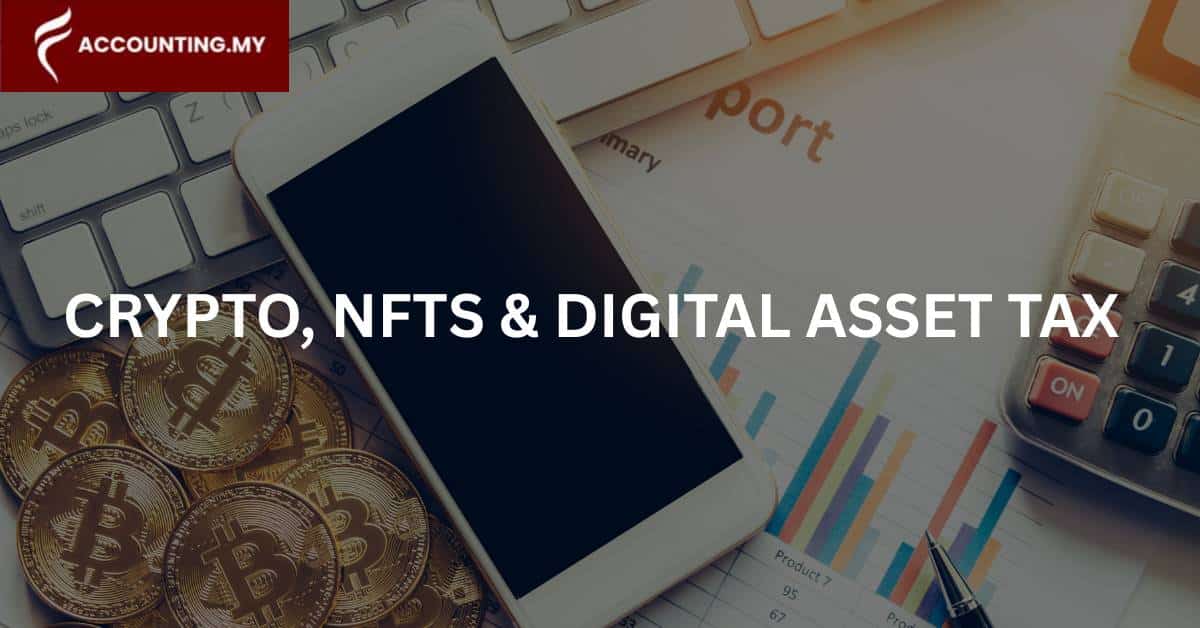Key Takeaways
- Crypto and NFTs are taxable in Malaysia if treated as business income; long-term, passive gains remain non-taxed.
- Income Tax Act 1967 applies to trading, mining, and exchanges; MOF and LHDN confirm alignment.
- Malaysia now has CGT on disposals of unlisted shares (from 1 Mar 2024) and RPGT on real property. There’s still no CGT specifically on crypto/digital assets.
- Service tax (SST) on foreign digital services started on 1 Jan 2020; in Aug 2025 MoF clarified that crypto trading platform services by local or foreign providers are subject to service tax per the relevant classifications.
- Good record-keeping and understanding “badges of trade” are key to avoiding unexpected LHDN assessments.
Crypto and digital assets are taxable in Malaysia if they’re treated as business income, but long-term holding is not taxed.
Many taxpayers in Malaysia are still scratching their heads over whether profits from Bitcoin, NFTs, or other digital assets are taxable income. Some assume “crypto is tax-free,” while others panic that every transaction must be declared.
The truth? It sits somewhere in between.
This guide breaks down what the law actually says, how LHDN applies it, and what you should do to stay compliant without overpaying.
What Is the Current Position on Crypto Tax in Malaysia?
Crypto and NFTs are not automatically taxed, it just depends on how you use them.
- In Aug 2025, the Ministry of Finance clarified that digital currencies are treated as commodities, and income from trading, mining or exchange activities is taxable under the Income Tax Act 1967, aligning with international practice.
- LHDN’s guidelines (2019, still applicable) confirm that frequent trading and mining are revenue income, but long-term holding is capital in nature (non-taxable, since Malaysia has no capital gains tax).
As MOF put it: “Crypto activities like trading, mining, and exchanges fall under taxable business income, in line with international practices.”
Do You Pay Tax on All Crypto Gains?
Not all crypto or NFT gains are taxable in Malaysia.
The tax treatment depends on whether your activity looks like an investment (capital in nature) or a business (revenue in nature).
When It’s Not Taxable
- Long-term investment: If you buy Bitcoin, hold it for several years, and later sell at a profit, that gain is treated as capital. Since Malaysia does not have a capital gains tax (CGT), you don’t pay tax.
- Casual NFT sales: Collecting NFTs for personal interest and selling them years later usually falls under capital gains, not taxable.
When It Is Taxable
- Active trading: If you flip crypto daily, weekly, or with clear intent to profit, LHDN views this as business activity, so profits are taxed as income.
- Mining operations: Running rigs or staking nodes for profit is considered an income-generating business, hence taxable.
- NFT creators or traders: Artists minting and selling NFTs, or traders flipping them regularly, must treat sales as business income.
Rule of Thumb
Investor (hold long term) → Not taxable
Trader/miner (frequent activity) → Taxable as business income
Practical Scenarios: How LHDN Sees It
Activity | Taxable? | Why |
Buy Bitcoin, hold 5 years, sell | ❌ No | Capital gain, Malaysia doesn’t tax capital gains |
Flip crypto weekly for profit | ✅ Yes | Frequent = business activity |
Mine Ethereum commercially | ✅ Yes | Mining = business income |
Receive crypto as payment for services | ✅ Yes | Counted as income, converted to RM value |
Sell NFTs as part of an art business | ✅ Yes | Treated like selling any business asset |
Receive free airdrop, hold it, sell later | ❌/✅ | Not taxable on receipt. May be taxable on disposal if it forms part of a trading/business activity. |
What Are the “Badges of Trade”?
LHDN doesn’t flip a coin to decide if your crypto gains are taxable. Instead, it applies a long-standing framework called the “badges of trade” , basically a checklist used to tell whether you’re behaving like an investor or a business operator.
The Badges of Trade
- Frequency of transactions: Buying Bitcoin once and forgetting your password for five years? Investor. Trading altcoins daily like you’re a Wall Street broker? Business.
- Intention to profit: Did you buy ETH because you believe in blockchain long-term, or because you planned to flip it?
- Length of ownership: Short-term = trade, long-term = investment. A coin you hold for weeks looks more like “stock” than a long-term asset.
- Financing method: If you borrowed money (credit card, loan) to buy crypto, that screams trading motive. Investments usually aren’t funded with borrowed cash.
- Work done: Running mining rigs, marketing your NFT collection, or actively promoting a coin = business activity, not passive investment.
- Nature of the asset: Are you treating your tokens like stock inventory (frequent turnover) or like gold (long-term store of value)?
- How gains are realised: Quick flipping for small profits vs holding until a major bull run. One signals trading, the other investment.
Why It Matters
The more boxes you tick, the higher the chance LHDN will call your gains taxable business income. It’s not about the coin itself, it’s about how you handle it.
Example:
- Ahmad buys Bitcoin in 2018, forgets about it, and cashes out in 2025 → not taxable.
- Mei Ling flips NFTs every month and runs ads on IG to promote her collection → taxable.
Read more: A Guide to Managing Money and Taxes in Gig Economy Malaysia
How Do You Report Crypto & NFTs to LHDN?
If your activity is classified as income (trading, mining, NFT sales), it must be declared just like any other business profit. The process depends on whether you’re an individual or a company.
For Individuals
- File under Form B (for those with business income).
- Report crypto/NFT gains under “business or other income.”
- Calculate profits in Ringgit Malaysia (RM), using the market exchange rate at the transaction date.
- Example: If you sold 1 ETH on 12 March 2025 for USD 3,000, convert to RM using the Bank Negara reference rate for that day.
For Companies
- File using Form C (corporate return).
- Treat crypto/NFT income as part of business revenue.
- Deduct allowable business expenses such as exchange fees, cloud mining services, or hosting costs.
What Expenses Are Deductible?
You can claim deductions if they are “wholly and exclusively incurred” to generate crypto income. Examples:
- Exchange/platform fees
- Transaction fees
- Mining electricity costs
- Cloud storage or server hosting fees
- Business-related internet/utilities
Not deductible: Personal purchases, speculative losses, or crypto bought for investment and held long-term.
Record-Keeping Checklist
LHDN audits are documentation-heavy. Keep the following:
- Transaction dates (buy, sell, transfer)
- Asset type (BTC, ETH, NFT collection name, etc.)
- RM value at time of transaction
- Transaction or gas fees
- Exchange/wallet statements or screenshots
Our recommendation: Use a crypto accounting app or spreadsheet to track your trades. Waiting until audit season to backtrack through Binance or Metamask can be a nightmare.
“Without detailed records, it’s almost impossible to prove whether your gains are capital (non-taxable) or revenue (taxable). LHDN will default to the less favourable interpretation if you can’t defend your position.”
Is Service Tax Relevant for Crypto?
Since 1 Jan 2020, foreign digital service providers are subject to service tax when they exceed the RM 500,000 threshold.
In Aug 2025, the MoF clarified that cryptocurrency trading platform services provided by local or foreign providers are subject to service tax, in line with service classifications and current rates. You may see this reflected in platform fees.
- This levels the playing field between local providers (like LUNO) and overseas platforms.
- Exchanges must register for SST if they cross the threshold, and users may see this reflected in transaction fees.
- For more information, check out how to register SST in Malaysia.
Common Mistakes to Avoid With Crypto & Digital Asset Tax
The biggest risk with crypto in Malaysia isn’t always the tax bill, it’s the penalties and stress that come with getting it wrong.
1. Assuming All Crypto Gains Are Tax-Free
- Reality: Only passive, long-term capital gains are tax-free in Malaysia.
- Law: Under the Income Tax Act 1967, any gain with the “badges of trade” (frequent, profit-driven activity) is treated as revenue income and taxable.
- Example: Buying BTC in 2017 and selling in 2025 = capital gain (not taxable). Flipping altcoins every week = business income (taxable).
2. Poor Documentation
- Problem: No transaction logs, missing wallet addresses, or failing to convert to RM at transaction date.
- Why It Matters: LHDN can’t distinguish capital vs business without proof, and may default to taxing all your gains.
- Note: Section 82A of the Income Tax Act requires businesses to maintain records for 7 years. That applies if your crypto is classified as income.
3. Trading Heavily on Foreign Exchanges
- Malaysia has a territorial basis of taxation. For resident individuals, foreign-sourced income received in Malaysia is exempt through 31 Dec 2026.
- Income derived from Malaysia is taxable regardless of which exchange you use. SC-registered local exchanges are regulated and must keep records/comply with AML-KYC.
4. Mixing Personal & Business Wallets
- Problem: Using the same wallet for holding and frequent trades makes it hard to separate capital from revenue.
- Impact: LHDN could classify everything as business activity.
- Fix: Keep separate wallets, one for investments (long-term), one for business/trading. It’s the crypto equivalent of having separate bank accounts.
5. Overlooking NFTs
- Reality: Selling NFTs regularly is taxable as business income, just like selling paintings or merchandise.
- Law: Section 4(a) of the Income Tax Act covers income from trade, business, profession, or vocation, which applies to NFT creators and frequent traders.
- Example: A one-off NFT sale years later may not be taxed, but running a collection drop on OpenSea? Definitely taxable.
6. Ignoring Service Tax Rules
- Problem: Many forget that Malaysia extended Service Tax (SST) in 2020 to cover foreign digital services.
- Impact: Crypto exchanges (local and foreign) providing services to Malaysians may need to register and collect SST. This doesn’t affect your personal gains directly, but it can change transaction costs.
Conclusion: Be Compliant on Digital Asset Tax in Malaysia
Crypto, NFTs, and digital assets in Malaysia aren’t automatically tax-free, it all depends on how you use them. Frequent trading, mining, or NFT sales count as taxable income, while long-term holding remains outside capital gains tax.
Both the Ministry of Finance (MOF) and LHDN are clear:
“Crypto is income when it behaves like income, and investment when it behaves like investment.”
So, if you want peace of mind, let the experts handle the compliance. At Accounting.my, we help businesses and individuals with company registration, tax planning, licensing, and financial reporting, so you can focus on building your portfolio while staying on the right side of the law.
Start smart, stay compliant, and the experts to simplify your digital asset tax journey.
Frequently Asked Questions About Crypto & NFT Tax
Yes, if your activity is trading, mining, or business-related.
Generally no, if it’s truly capital in nature.
Yes, if you sell them frequently or as part of a business.
Declare income in Form B (individual) or Form C (company) in RM value.
Yes, they’re treated as business income.
They may have service tax obligations when supplying digital services to Malaysian consumers and exceeding the threshold.















